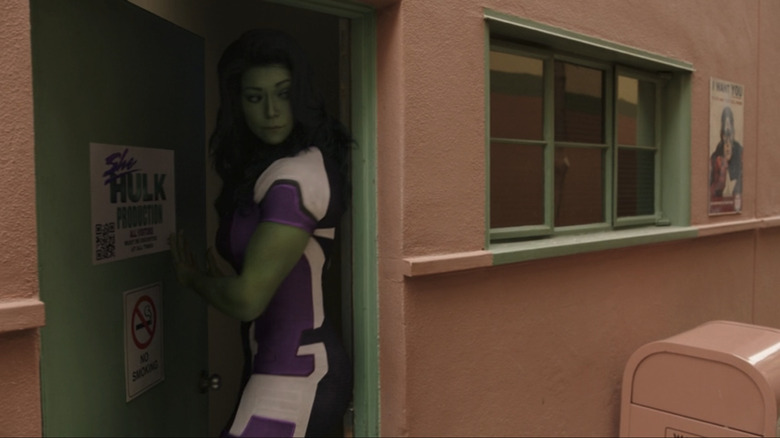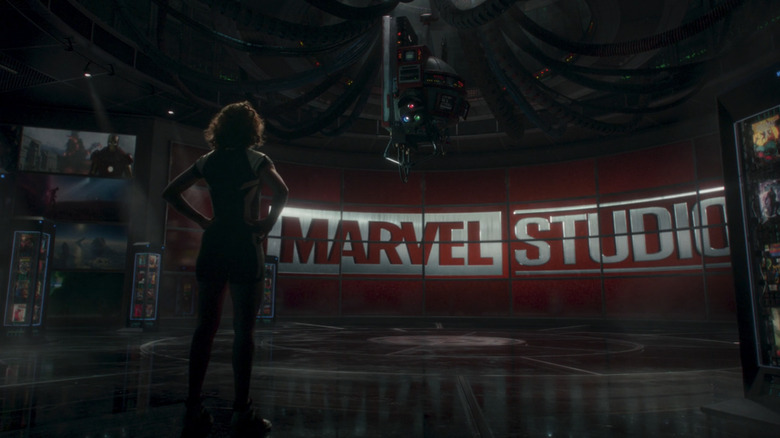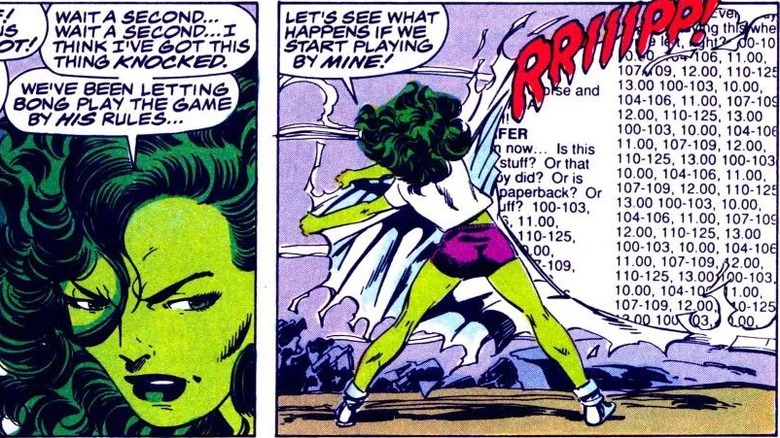She-Hulk Almost Had A More Traditional Finale
This article contains major spoilers for "She-Hulk: Attorney at Law."
The Marvel Cinematic Universe's newest Disney+ series "She-Hulk: Attorney At Law" aired its finale this week, and its fourth wall-shattering ending has cemented the show as one of the MCU's boldest departures from the status quo so far. Just when it seemed the show was about to devolve into a third act smackdown of laser beams and explosions, Jennifer Walters (Tatiana Manslany) takes control of her own narrative, literally.
When all of her friends, family, and enemies have a tense, unexpected gathering in Emil Blonsky's (Tim Roth) cabin, Jennifer notices that this show is starting to really jump the shark. She glances at the camera, "Are you guys into this?" Eventually, she even leaps out of the Disney+ home screen and into our reality, heading to Marvel Studios to speak to the writers room as well as K.E.V.I.N., the algorithmic robot in charge of churning out projects.
Jennifer makes a compromise with K.E.V.I.N. to rewrite the show's last episode to be fulfilling for her character arc, wants, and needs. After all, whose show is this?
In an interview with Marvel's official blog, head writer Jessica Gao revealed that the ending wasn't always planned to be this meta. In fact, the initial pitches for the show's final episode were a lot more standard Marvel fare.
Kevin Feige helped push head writer Jessica Gao in the right direction
When asked about her unconventional approach to the Marvel third act Gao admitted, "I think I probably wrote like, 20 versions of a finale that went all over the place and I started feeling like, 'Well, this is a Marvel show, I better give them the classic Marvel ending.'" She continued, "big villain fight, big finale. But it never felt right because I was trying to fit a square peg in a round hole."
Ironically, despite the episode alluding to the man as a wicked, robotic puppet master of the MCU, Marvel Studios president and executive producer Kevin Feige ultimately was the push in the right direction that Gao and her team of writers needed.
"[Kevin Feige] really opened my mind to the idea that it's okay to not do that, because I was trying to do what I thought was the Marvel expectation of what the show had to be. He was like, 'Why? No one's telling you to do that, you don't have to do that, you can do something completely different, we should be doing something completely different because this show is so different from anything that Marvel has done.' It was getting that permission from him that really made me think, 'Oh.' It just changed everything."
Inspiration from John Byrne's Sensational She-Hulk brought us the meta finale the show deserved
The dichotomy of how creators talk about collaborating with Feige versus the reputation he has as the face of a studio with a history of creative interference is fascinating. "Eternals" director Chloé Zhao once similarly praised Feige as a trusting and guiding creative force as well.
Greatly inspired by the equally self-aware John Byrne "Sensational She-Hulk" run, the meta fourth wall break gave Gao room to address the internet's critiques of Feige and Marvel Studios through Jennifer's lens. "It felt natural that not only that she was in a show, but that she would have opinions about the show," Gao said, "especially since she just was completely betrayed by the makers... It just felt right that she would go and complain to the ultimate lord of Marvel, which is K.E.V.I.N.."
Gao keeps details of her original drafts vague, but whether it ends with Jennifer taking on the Hulk-roided incel Todd down with Bruce, or fighting Titania with her fists instead of her intellect, we greatly prefer the ending we got way more. "She-Hulk" is ultimately a sitcom in the Marvel Cinematic Universe, one of the first Disney+ series to truly embrace the format of television — and its wacky but thematically fulfilling ending keeps the show true to itself.


